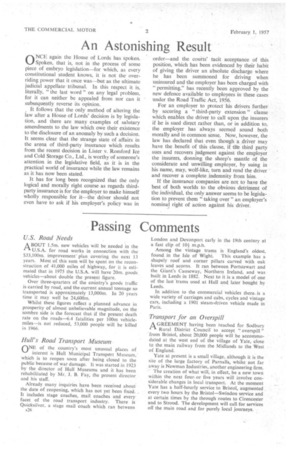An Astonishing Result
Page 28

If you've noticed an error in this article please click here to report it so we can fix it.
ONCE again the House of Lords has spoken. Spoken, that is, not in the process of some piece of embryo legislation—for which, as every constitutional student knows, it is not the overriding power that it once was—but as the ultimate judicial appellate tribunal. In this respect it is, literally, "the last word" on any legal problem, for it can neither be appealed from nor can it subsequently reverse its opinion.
It follows that the only method of altering the law after a House of Lords' decision is by legislation, and there are many examples of salutary amendments to the law which owe their existence to the disclosure of an anomaly by such a decision. It seems clear that the strange state of affairs in the arena of third-party insurance which results from the recent decision in Lister v. Romford Ice and Cold Storage Co., Ltd., is worthy of someone's attention in the legislative field, as it is in the practical world of insurance while the law remains as it has now been stated.
It has for long been recognized that the only logical and morally right course as regards thirdparty insurance is for the employer to make himself wholly responsible for it—the driver should not even have to ask if his employer's policy was in order—and the courts' tacit acceptance of this position, which has been evidenced by their habit of giving the driver an absolute discharge where he has been summoned for driving when uninsured and the employer has been charged with "permitting," has recently been approved by the new defence available to employees in these cases under the Road Traffic Act, 1956.
For an employer to protect his drivers further by securing a "third-party extension" clause which enables the driver to call upon the insurers if he is sued direct rather than, or in addition to, the employer has always seemed sound both morally and in common sense. Now, however, the law has declared that even though a driver may have the benefit of this clause, if tffe third party sues and recovers judgment against the employer the insurers, donning the sheep's mantle of the considerate and unwilling employer, by suing in his name, may, wolf-like, turn and rend the driver and recover a complete indemnity from him.
If the insurance companies are not to have the best of both worlds to the obvious detriment of the individual, the only answer seems to be legislation to prevent them "taking over" an employer's nominal right of action against his driver.




































































































